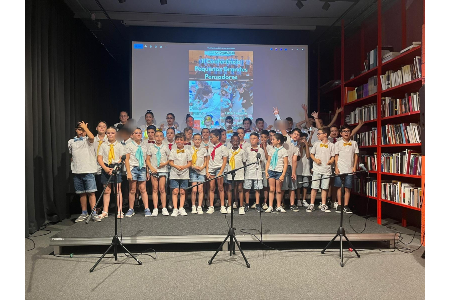“Success is the poetry that each child writes on their life’s journey,” says Nádia Bastos, mentor of the UNIVERSOS project and a teacher at Escola do Marco (Agrupamento de Escolas António Sérgio).
Realising that some students lacked motivation and had no goals for the future, she developed the project to promote a multidisciplinary approach and link essential learning to career opportunities. This involves university faculty members visiting the classroom and students visiting the faculties, as well as workshops and practical activities that promote STEM careers by setting challenges that apply curriculum content in a practical way. Collaboration between classes and coordination between teachers ensure an environment of sharing and continuous research.
With this goal and a topic in mind — Robotics linked to Engineering — Nádia approached the Faculty of Engineering at the University of Porto (FEUP) through Prof. Raul Vidal, Professor Emeritus at the University of Porto (DEI/FEUP). Prof. Vidal then encouraged Gonçalo Leão (ProDEI student) and his supervisor, Prof. Armando Sousa (DEEC/FEUP), to join the team — a challenge that they readily accepted.
To formalise and strengthen the collaboration, the two teams made reciprocal visits: the FEUP team visited the Marco School on 28 January 2025 and the Marco School visited FEUP on 20 February 2025. Regarding the latter visit, Prof. Armando Sousa, who has extensive experience in robotics for junior education, learning games, and technology in education, prepared three activities (Human LightBot, PC LightBot, and REDI) for the 41 students from the two visiting classes to try out in turn. These activities aimed to encourage critical and creative thinking — one of the added values of this project — and revolved around the question, ‘How can we get to and from school while keeping ourselves and our planet healthy?’
The aim of this collaboration was to broaden the horizons of primary school students and introduce them to universities and professional realities from an early age, thus facilitating future career decisions and developing essential skills. The UNIVERSOS project has partnerships with the Abel Salazar Institute of Biomedical Sciences (ICBAS), the Faculty of Fine Arts (FBAUP) and the Faculty of Arts (FLUP), covering a variety of subject areas and potential future careers.
The project culminated in a conference entitled ‘Conferência de Pequenos Grandes Pensadores’, which took place at Casa Comum da Reitoria da Universidade do Porto on 26th of June. The event brought together everyone involved in the project, including students, teachers, parents, and the faculties involved in this second edition, ICBAS and FEUP. The event was a celebration of the knowledge acquired, and an opportunity to share it.
According to Nádia, the results are excellent and encouraging: ‘100% of participants showed ambition to continue their studies, and negative grades were significantly reduced.’ Students with a fear of school started to enjoy school, others learned to read after years of struggling, and motivation, skills and self-esteem increased significantly. Their projects have won national and international awards, particularly in writing, poetry, science and citizenship competitions.”
Reflecting on the experience with the Marco Primary School, Prof. Raul Vidal says, ‘I was amazed and it far exceeded my best expectations. I came across boys and girls aged eight and nine who were very curious, quick-witted and eager to learn. I think it is very worthwhile investing in initiatives like this, which deserve to be widely publicised and strongly supported.’
UNIVERSOS (formerly “Crescer Contigo: um projeto de vida com sentido”) is currently being implemented in several schools in Porto and has been presented at an international conference. The teachers’ best practices continue to be shared in Erasmus+ projects.
Prof. Nádia Bastos was a finalist for the Global Teacher Prize 2025 in recognition of her innovative work and dedication to education.
